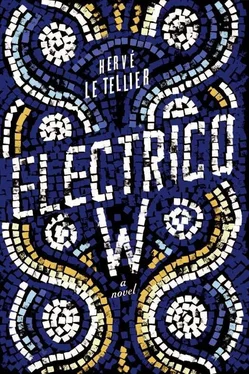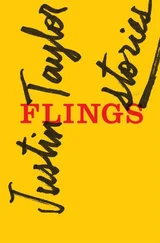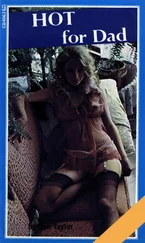Centuries before our era, Mongols of the Ouchis tribe worshipped an adolescent named Ohisha who, when he reached puberty, stopped aging. Fascinated by this phenomenon, they soon made him their leader. The young man did, however, die at the age of seventy-three. The legend of Ohisha ended with these words: “Lying on his shroud he was still identical to himself. For all those years, only his body had aged terribly.”
I hadn’t got very far with this work when Antonio Flores called. He asked me to move in with him for a fortnight to follow the Pinheiro trial, and I was happy to bring an end to my isolation. I didn’t give up the room, I had adopted my own routine there. Antonio booked a hotel on the rua Primeiro de Dezembro in the center of town. It was quite expensive, but the paper was picking up the bill.
The Pallazo Meiras, which dated back to the early 1900s, was both tired-looking and luxurious. This palace must once have had some appeal, but renovations had reduced it to one of those international havens where you never feel at home, and don’t even want to unpack your bags. As I walked through the door I felt I had stepped into a strange ship washed up in the middle of the city, a steamer in pink marble and gray stone. The staff went about their business languidly and managed to communicate their boredom to guests. The main entrance was draped with black-and-white-striped fabric and opened onto a small paved courtyard. In this funereal setting, despite his red livery, the footman looked like an undertaker waiting for a coffin to carry.
Antonio had booked two suites on the third floor. They were exact mirror images of each other, and the two lounges were connected by heavy double doors. Once we had opened these, the central room made more sense, with our bedrooms to either side. Antonio immediately dumped his equipment on a large carved oak desk, and I put my files on its twin. The brownish leather of two armchairs sat uncomfortably with the straw yellow of two more-rustic-looking chairs; the balconies looked out over Restauradores Square, and the noise was tolerable if we didn’t open the windows.
It was ten years since Antonio had been in Lisbon. He had recently bought a tiny one-bedroom apartment in the old Belleville quarter of Paris, and I knew he had also lived in Rio, as well as spending a few months in London’s Soho. He had made a name for himself in the small world of war photographers.
In the taxi on the way back from the airport, I asked why the long absence, and he just said, “A thing. A thing with a woman.” We didn’t exchange another word, and I regretted being so inquisitive. But that first evening, in a tasca in the port where we were having a last glass of bagaço, he started talking, in snippets, as if one memory led to another. From the emotion in his voice and the muddled way he confided in me, I suspected he had never opened up to anyone and could only do so at last because I was a foreigner. I let him talk.

ANTONIO FLORES IS ELEVEN, he lives in the old Bairro Alto quarter. Known as just Tonio, he is hurtling down the long flight of cement steps on the Travessa do Carmo. It is early May, the morning light is more blinding than golden. His schoolbag lurches in every direction on his back, buffeted from one shoulder to the other like a panicking rider on a runaway horse.
Every schoolday, Tonio races the Eléctrico W, which stops outside his house at 8:18 in the morning. Tonio had trouble getting up today, the 8:18 has already left and he’s waiting for the 8:24. He will be late for school, for sure.
The Eléctrico W is the yellow-and-white funicular tram which carries its cargo of housewives and office workers every morning — except for Sundays and public holidays. True, it’s ancient, but whatever the weather it trundles unfailingly from the old Bairro Alto quarter to the exhaust fumes and traffic jams of Baixa.
Several feet ahead of Tonio, the W rolls down the hill on its steel rails, making terrible metallic screeching sounds. The pantographs splutter with bright sparks against the azure sky, the traction cable at the back rises up from the rusted channel cut into the cement. Tonio runs behind it, keeping an eye on every sway of the cable, imagining it is the trailing black tail of a tired old dragon. In the rear of the carriage, a kid with a lollipop presses his grubby face against the steamed-up window and stares at Tonio, his empty eyes crushed by boredom.
Tonio runs. He knows every paving slab on the Travessa do Carmo, every stone, every porch: right on the corner the step is a bit high, you really have to stretch your leg to avoid tripping; here, to turn as sharply as possible, you can spin on the No Parking sign; there, on that street corner, it’s better to slow up, last week he knocked down a smartly dressed old man coming out of a tasca. Of course, he could run just behind the W, on the concrete slope, but he’s already fallen once, catching his shoe in the rim of the rail, and it hurt too much. It left him with a scar as white and shiny as a trail of salt, and the pharmacist, Mr. Pereira, claimed he would have a mark there “till the day he died.” The thought of his own death — he was only six at the time — terrified him and he started crying. His mother kissed him to comfort him, and turned angrily on the pharmacist: “Mr. Pereira, really! What sort of thing is that to say to a child?”
With all this reminiscing, the W has got a little way ahead, and Tonio runs like a boy possessed.
“Go on, Tonio, go on, faster, you’ve got to turn back time …,” laughs the fishmonger, and he lobs a hail of crushed ice at the boy, its smell strong with seaweed and saltwater. Tonio ducks to avoid it and carries on with his race. Just ahead, the tram turns to the left and disappears around the corner. Tonio slows abruptly, skids in the dust and gravel, and comes to a stop, breathless.
This is because, after the corner, the steps come to an end, and with them the Travessa do Carmo’s narrow sidewalk. The W forks off and continues on its way alone in the clear cool shade of a narrow corridor between buildings. Deadened by the shuttered facades, the noise drops, becomes muffled. At the end, fifty paces farther, the dark mouth of a tunnel gapes, and when the tram enters it, the neon lights in the cabin and the round red taillight come on. In the underground darkness, sparks fly from the catenaries, lighting up the curve of the vaulted ceiling like the thousand fires of hell in the illustrated Bible his aunt gave him.
The glowing sparks fade in the distance, the sound of the Eléctrico W is swallowed by the hubbub of the city, and Tonio hears someone behind him say, “Hey, you really run fast …”
She is seven years old, maybe eight, big black eyes, a straight nose. She has long dark hair, neatly smoothed. Tonio can’t speak, he is still out of breath, his hair clinging to his sweating face.
She smiles.
“Well, my name’s Duck, it is.”
“What? What’s your name?”
“Duck, like I said. Everyone calls me that. You can too, if you like, you can call me Duck. And what’s your name?”
Tonio stays silent for a moment, rubbing his aching legs.
“Antonio … Well, Tonio. Do you live round here?”
She points to one of the buildings that look down over the W’s route. Its white facade is dazzling in the sunlight, and Tonio screws up his eyes.
“Over there. You can’t see it from here.”
She lowers her arm and watches him with a pout. Tonio is intrigued, but he’s also growing impatient.
“I have to go to school. I’m late. Aren’t you?”
“Yes, yes, of course I’m late. Well then? Go on, keep running, go to school, if it’s that important.”
Читать дальше













